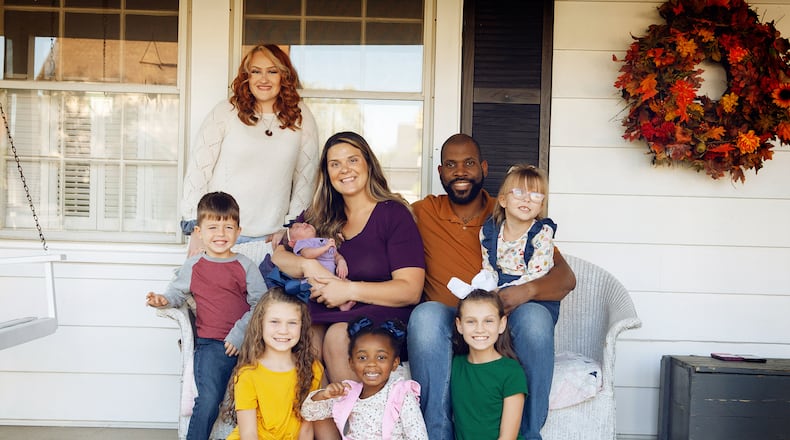Megan Ivery and her identical twin sister grew up in Sidney with parents who shared their home with foster children. Ivery remembers many children moving in and out over the years and it fueled her desire for a large family.
“When I got married, I knew right away I wanted to start a family,” Ivery, who lives in Harrison Township, said. “We were attending a church in Kettering and there were a lot of folks fostering there.”
Ivery and her husband, Shimar, met with their pastor about fostering. At the same time, they were also trying to get pregnant. The pastor recommended they work on their biological family first, but after a year of trying, Ivery still wasn’t pregnant. The couple signed up to foster and within a couple of months, they got their first placement of a little boy who needed a place to live after a family tragedy. But he only stayed with them for four days before he went back home.
The next month, two little girls who were also up for adoption, came to live with the couple. Ivery and her husband were both working full time and the girls were just three and four years old.
“We felt we needed to establish a solid relationship with them, so I decided to stay at home full time,” Ivery said. “Then we got a call about two more children – a boy and a girl.”
In less than six months, the couple became a family of six, with children ranging in age from nine months to four years.
Over the years, Ivery and her husband have welcomed more children into their home and legally adopted the original four. They provided a temporary home for 16-year-old Zoie in 2019 and ended up adopting her.
But though their home was full of children, Ivery said she longed to give birth to a child. Still not pregnant on her own, she began researching IVF and discovered that many of the embryos created by couples undergoing this process remained frozen and viable.
“Instead of terminating unused embryos, it turns out families will keep them frozen until they figure out what to do,” Ivery said. “They don’t want to terminate them knowing they have the ability to live.”
Ivery found the Snowflake Embryo Adoption program – part of Nighlight Christian Adoption. The agency has been helping couples adopt frozen embryos since 1997 and became an accredited embryo adoption agency in 2021.
“We found this works very similarly to foster care and adoption where you have preferences,” Ivery said. “We were open to many different things and since my husband is African American and I am white, we wanted to look at non-Caucasian embryos.”
After six months, the couple was matched with a family who had chosen them to adopt one of their frozen embryos. The agency helps match everything from values and beliefs to race and background.
“The only thing we didn’t know was last names and location of the family,” Ivery said. “We saw pictures of the two other babies that had been born to them.”
Since embryos are not technically considered children by any government agency, the process is more like a transfer of property through legal contract. That way when the baby is born, there is no adoption process required.
“We felt that since there are millions of frozen embryos out there, it made sense to give one a chance at life,” Ivery said.
Eight days after Ivery had her embryo implant, she took a home pregnancy test and it was positive. Daughter Hanaley, frozen as an embryo for more than 19 years, was born nine months ago and today is a very active and healthy baby.
Hanaley is half Indian-Asian and half Caucasian and her now 20-year-old siblings were created from donor eggs. Ivery said that Hanaley’s siblings do not know the backstory of their birth, but she has always shared the full stories of their backgrounds with all of her children. And that includes Hanaley.
“We have five still at home right now,” Ivery said. “We have closed our foster license and are open to having another baby if we get pregnant. We had a very positive experience with the Snowflake program, and it was wonderful from start to finish.”
For more information, log on to nightlight.org
About the Author



